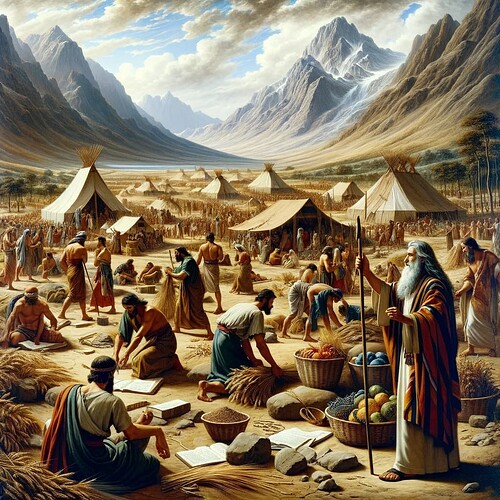 February 13: Exodus 23 - The Execution of Justice and the Promise of God’s Presence
February 13: Exodus 23 - The Execution of Justice and the Promise of God’s Presence
 Introduction
Introduction
Exodus 23 further outlines God’s laws and standards for the Israelites. These guidelines are framed around justice, integrity, and community responsibility - principles that resonate throughout time and continue to be relevant in today’s world.
 Exodus 23: A Call for Honesty, Fairness, and Mercy
Exodus 23: A Call for Honesty, Fairness, and Mercy
Exodus 23 is noteworthy for its insistence on justice. This chapter urges us not to pervert justice, and to ensure that the poor are not denied their rights (Exodus 23:6).
The chapter is notable for promoting communal responsibility, kindness to foreigners and thorough rest, including Sabbath years and days for people, animals, and land.
![]() Key Verse: Exodus 23:12: “Six days you shall do your work, and on the seventh day you shall rest; that your ox and your donkey may have rest, and the son of your female servant and the stranger may be refreshed.”
Key Verse: Exodus 23:12: “Six days you shall do your work, and on the seventh day you shall rest; that your ox and your donkey may have rest, and the son of your female servant and the stranger may be refreshed.”
 Key Themes and Reflections
Key Themes and Reflections
In this chapter, we can decipher two major themes that hold paramount relevance today:
- The importance of justice and integrity in our dealings
- The significance of rest, and the realization that rest isn’t just physical but also spiritual in nature.
 Today’s Application
Today’s Application
Like the Israelites, we are also urged to maintain a high standard of integrity and impartiality in our interactions with others. Remember, everyone deserves kindness and fairness, irrespective of their identity or societal status. Incorporate rest in your lifestyles as it is a divine teaching, to recharge and reinvigorate our bodies and minds.
 Hidden Gem
Hidden Gem
A lesser-known historical fact is that these sections of law are among the oldest in the Bible, predating even some of the Decalogue!
 Reflective Q&A
Reflective Q&A
![]() Why might God instruct the Israelites to have such detailed laws for social justice?
Why might God instruct the Israelites to have such detailed laws for social justice?
A: This shows that God cares about how we treat each other and that righteousness and justice are at the heart of His Kingdom.
![]() Why is rest recurring in God’s instructions?
Why is rest recurring in God’s instructions?
A: God designed us to need rest. It is a reminder of our finite nature and our need for Him.
 Join the Discussion
Join the Discussion
How do you ensure justice and fairness in your daily lives?
What is your take on rest and Its spiritual implications?
